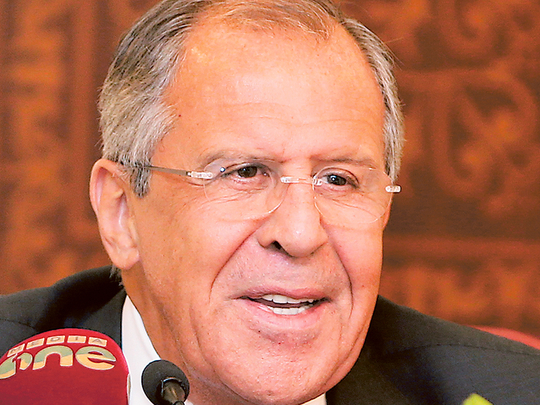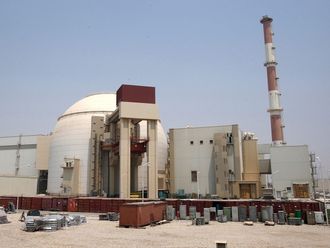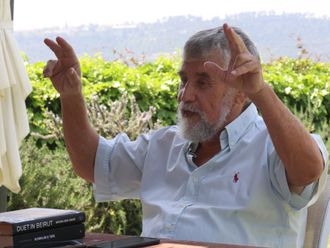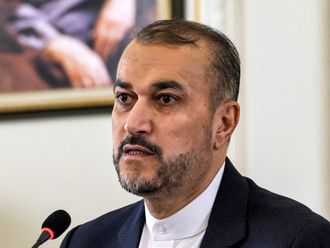
Moscow: Russian Foreign Minister Sergei Lavrov said the United States should cooperate with Syrian President Bashar Al Assad to fight Daesh and that this required an international coalition uniting all those for whom the terrorists are “a common enemy”.
Washington currently heads a coalition conducting air strikes on Daesh in Syria and Iraq and is cooperating with Turkey to provide air cover for rebels inside Syria.
But Moscow has criticised the US for not working in sync with Syria, an ally of Russia.
In comments to Russia’s state TV published by his ministry on Sunday, Lavrov recounted two meetings with US Secretary of State John Kerry amid the recent intensified high-level diplomatic contacts over Syria and fighting Daesh.
“Our American partners and some countries in the region persistently refuse to recognise Al Assad as a partner, which is rather strange,” Lavrov said.
“Al Assad was a fully legitimate partner in destroying chemical arms but somehow he is not in fighting terrorism,” the foreign minister said, referring to a chemical disarmament deal brokered by Moscow and Washington earlier in the conflict.
The US, its regional ally Saudi Arabia as well Syrian opposition and rebel groups they back, say Al Assad had to go. They do not want to cooperate with him as it could be seen as legitimising his position.
Lavrov is due to discuss Syria and Daesh with Saudi Foreign Minister Adel Al Jubair in Moscow on Tuesday. The two will also discuss “closer coordination on global energy markets”, the Russian ministry said.
Russia is one of the world’s biggest oil producers and low prices are hurting its budget. Moscow held multiple meetings on that with Opec members, including Riyadh, but the cartel has focused on defending market share rather than raising the price.
In the comments published on Sunday, Lavrov also said he had told Kerry there was high risk air strikes in Syria could hit the wrong target and aggravate the conflict.
The Russia-proposed coalition, Lavrov said, would “bring together all those already fighting on the ground” who oppose Daesh. He named the Syrian and Iraqi armies, the Kurds and “the part of the armed opposition that represents Syrians.”
“Instead of settling their scores between one another, first one must deal with the common threat, and then seek to agree on how to live in their own country,” Lavrov said.
Talking points in any peace plan
- A series of recent diplomatic manoeuvres suggest a growing willingness to at least engage with the Iranian-backed government of Bashar Al Assad on ways to end the country’s civil war. The embattled leader seems no more inclined to step aside now than he did four years ago, and any agreement still looks to be far off — but the search seems to be on for an elegant solution that might, for example, allow him a transitional role.
- Breaking the ice: In the wake of mediation by President Bashir Al Assad’s Russian patrons, a quiet, ice-breaking meeting took place in Riyadh in late July between Brig. Gen. Ali Mamlouk, the head of Syria’s powerful National Security Bureau, and Prince Mohammad Bin Salman, Saudi Arabia’s deputy crown prince and defence minister. That represented a significant shift and an opening of channels between two countries that have become arch foes in Syria’s conflict. Saudi Arabia along with other Gulf states has been a key backer of rebels fighting to topple Al Assad.
- Oman as brokers? Syrian Foreign Minister Walid Al Mu’allem flew to Oman last Thursday after a two-day visit to Tehran, amid unconfirmed reports in pro-Al Assad media outlets that the Omani government was trying to broker a meeting of the foreign ministers of Syria, Iran and Saudi Arabia.
- A plan from Tehran: Iran has said it is preparing to submit a four-point peace plan proposal for Syria to the United Nations. According to some reports, it includes a “national unity government.” That is code for allowing Al Assad a face-saving period in which he shares power — and elections under international supervision. But it would also bring some prominence to the otherwise marginalised relative moderates who have failed to dislodge Al Assad militarily.
- Saudi flexibility? Simon Henderson, director of the Gulf and energy policy programme at The Washington Institute, said the current Saudi leadership is still opposed to any scenario that gives Iran a strategic victory in Syria by leaving Al Assad or another strongman of his Alawite sect in power. But he said the new leadership in Saudi Arabia since the death of King Abdullah is shaking up old assumptions. Mohammad Bin Salman, the powerful deputy crown prince, is “prepared to go outside the fences that were previously erected,” Henderson said.
- UN motion: US Secretary of State John Kerry and Russian Foreign Minister Sergei Lavrov agreed on a UN resolution aimed at identifying those responsible for chemical weapons attacks in Syria on Wednesday and the Security Council adopted it on Friday.
- Security Council endorsement: Russia’s UN Ambassador Vitaly Churkin says there is “a high possibility” that the Security Council, which is deeply divided over Syria, will adopt a presidential statement this week endorsing a new plan by UN special envoy Staffan de Mistura aimed at setting the stage for new peace talks.
- Preliminary talks: De Mistura said late last month that it’s too soon for a third Geneva peace conference and instead called for intensive preliminary talks with all parties to the conflict on key issues including a political transition and fighting terrorism.
- Compromise in the air: Although few will say so in public, there is an increasing acceptance that a compromise may in the end be essential.
- Territory counts: Al Assad’s enormous territorial losses may be pushing him to explore diplomatic options to resolve the crisis. But he is unlikely to fully step aside, and if anything, he may be more inclined to cling to power in the hope that an Iran freed of economic sanctions would support him all the more with funds for his battered army.
- The Doha meeting: Kerry, Lavrov and Saudi Foreign Minister Adel Al Jubeir held a rare three-way meeting last monday in the Qatari capital, Doha. The session included discussions about the Syrian crisis.
- A transitional figure: Lavrov also met Mouaz Al Khatib, a former president of the Syrian National Coalition opposition group whose name is often mentioned as a possible transitional figure, during his Qatar trip.
- An awkward settlement: The US would find it extremely awkward to formally back any plan that would legitimise the Syrian government. Kerry reiterated Washington’s position in Doha, saying that “Al Assad and the Al Assad regime long ago lost legitimacy,” even as he again called for a political solution to the crisis.
- Tehran backing: Iran is unlikely to drop its support for Al Assad even if its nuclear deal presents the prospect of a diplomatic opening with the West. Kerry said in Doha that while he hopes there can be “a turning of the page” with Iran on various regional issues, so far a diplomatic option hasn’t presented itself on Syria.
- Clinging to power: Al Assad still has a firm grip on core areas key to his survival, even though he has lost perhaps more than half the country to hundreds of rebel groups and Islamic extremists. In a speech last month — his first public address in a year — he acknowledged his troops had lost territory and were running short on manpower, but he vowed to win the war, making clear he would fight to the end.
— Compiled from agencies












